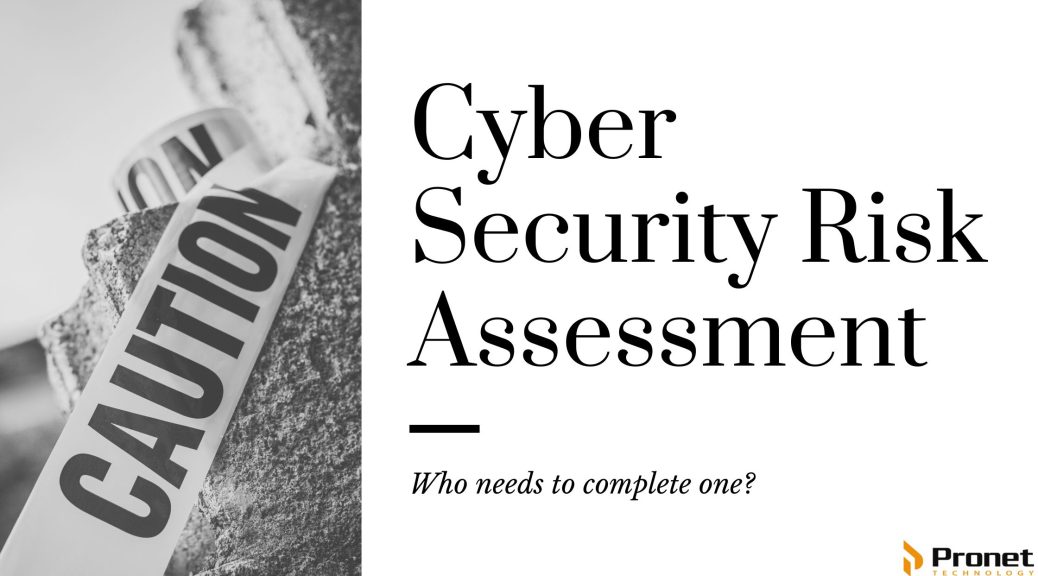Who is a Cyber Security Risk Assessment for?

As we move towards a more digitised world, the importance of Cyber Security continues to increase. Cyberattacks have become more frequent, sophisticated and damaging over the years. It’s essential to ensure the safety and security of your organisation’s information and technology assets. One of the best ways to achieve this is by conducting a Cyber Security Risk Assessment.
A Cyber Security Risk Assessment is a process of identifying, analysing and evaluating potential risks and vulnerabilities in an organisation’s digital environment. It involves evaluating the security measures in place and identifying any weaknesses that can lead to data breaches, cyberattacks or other security incidents. The ultimate goal of a Cyber Security Risk Assessment is to develop a comprehensive security plan that minimises risks and protects an organisation’s digital assets.
Why is a Cyber Security Risk Assessment important?
The world is witnessing a surge in cybercrime activities. Hackers and cybercriminals are always looking for ways to infiltrate an organisation’s digital environment and exploit vulnerabilities. A Cyber Security Risk Assessment helps organisations identify potential risks and vulnerabilities in their digital environment, enabling them to take proactive measures to mitigate such risks.
A Risk Assessment also helps organisations to comply with various regulatory requirements such as The Privacy Act 1988. Compliance with such regulations is crucial, as non-compliance can lead to hefty fines, legal liabilities and reputational damage.
Who is a Cyber Security Risk Assessment for?
A Cyber Security Risk Assessment is for everyone, irrespective of the size or nature of the organisation. Any organisation that stores, processes or interacts with information over the internet is at risk of cyberattacks. Therefore, every organisation needs to conduct a Risk Assessment to identify potential risks and vulnerabilities and develop a comprehensive security plan.

Small and Medium-sized businesses (SMBs)
Small and medium-sized businesses (SMBs) often assume that they are not at risk of cyberattacks because they are small or don’t have much valuable information. However, this is not true. Hackers often target SMBs because they have weaker security measures in place, making them easy targets. Another fact that SMBs should be aware of is that most cyberattacks are non-targeted. It is likened to a fisherman casting a wider net to catch as many fish as possible instead of spending the time and resources to catch the ideal fish. Also, some criminals would prefer not to target high-profile companies for fear of being the centre of an investigation by government enforcement agencies like the Australian Federal Police. A Cyber Security Risk Assessment can help SMBs identify potential risks and vulnerabilities and take proactive measures to mitigate such risks.
Enterprises
Enterprises often have a complex digital environment, making it challenging to identify potential risks and vulnerabilities. A Cyber Security Risk Assessment can help enterprises assess their security posture and identify potential risks and vulnerabilities across their entire digital environment.
Government Agencies
Government agencies often store sensitive information such as citizens’ personal information, national security secrets and confidential data. A Cyber Security Risk Assessment can help identify potential risks and vulnerabilities in government agencies’ digital environment, enabling them to take proactive measures to protect sensitive information.
Healthcare Industry
The healthcare industry is one of the most targeted industries by cybercriminals. Electronic Health Records (EHR) and other digital healthcare information are extremely valuable to hackers. A Cyber Security Risk Assessment can help healthcare organisations identify potential risks and vulnerabilities and take proactive measures to secure their digital environment.
How is a Cyber Security Risk Assessment conducted?
A Cyber Security Risk Assessment typically involves the following steps:
- Scope Definition: Defining the scope of the assessment, including the digital assets to be evaluated, the assessment methodology and the expected outcomes.
- Asset Identification: Identifying all the digital assets within the scope of the assessment.
- Threat Identification: Identifying all potential threats and vulnerabilities to digital assets.
- Risk Analysis: Analysing the likelihood and impact of potential risks and vulnerabilities.
- Risk Evaluation: Evaluate the risks and vulnerabilities to determine the most critical ones.
- Risk Treatment: Developing and implementing a plan to mitigate identified risks and vulnerabilities.
- Risk Monitoring: Continuously monitoring the digital environment to identify any new potential risks and vulnerabilities.
It’s important to note that conducting a Cyber Security Risk Assessment is not a one-time process. The digital environment is continually changing and new threats and vulnerabilities can emerge at any time. Therefore, it’s essential to conduct regular assessments to ensure the digital environment remains secure.
A Cyber Security Risk Assessment is a critical process that every organisation must undertake to protect its digital assets. It helps identify potential risks and vulnerabilities, enabling organisations to take proactive measures to mitigate such risks. It also helps organisations comply with regulatory requirements, minimise legal liabilities and protect their reputation.
No organisation is immune to cyberattacks and the consequences can be devastating. Therefore, it’s essential to conduct regular Cyber Security Risk Assessments to ensure the digital environment remains secure. Don’t wait until it’s too late; conduct a Cyber Security Risk Assessment today and protect your organisation’s digital assets.

FAQs
- What are the benefits of conducting a Cyber Security Risk Assessment?
Conducting a Cyber Security Risk Assessment helps organisations identify potential risks and vulnerabilities, enabling them to take proactive measures to mitigate such risks. It also helps organisations comply with regulatory requirements, minimise legal liabilities and protect their reputation.
- What happens if an organisation doesn’t conduct a Cyber Security Risk Assessment?
An organisation that doesn’t conduct a Cyber Security Risk Assessment is at risk of cyberattacks, data breaches, legal liabilities and reputational damage. It can also face hefty fines for non-compliance with regulatory requirements.
- Can small businesses benefit from conducting a Cyber Security Risk Assessment?
Yes, small businesses can benefit significantly from conducting a Cyber Security Risk Assessment. Hackers often target small businesses because they have weaker security measures in place, making them easy targets. Conducting a Cyber Security Risk Assessment can help small businesses identify potential risks and vulnerabilities and take proactive measures to mitigate such risks.
- How often should an organisation conduct a Cyber Security Risk Assessment?
An organisation should conduct a Cyber Security Risk Assessment at least once a year or whenever there is a significant change in the digital environment.
- What are the steps involved in conducting a Cyber Security Risk Assessment?
The steps involved in conducting a Cyber Security Risk Assessment include scope definition, asset identification, threat identification, risk analysis, risk evaluation, risk treatment and risk monitoring.
- How long does a Cyber Security Risk Assessment take?
The duration of a Cyber Security Risk Assessment depends on the size and complexity of the digital environment being assessed. However, it typically takes anywhere from a few weeks to several months to complete.



